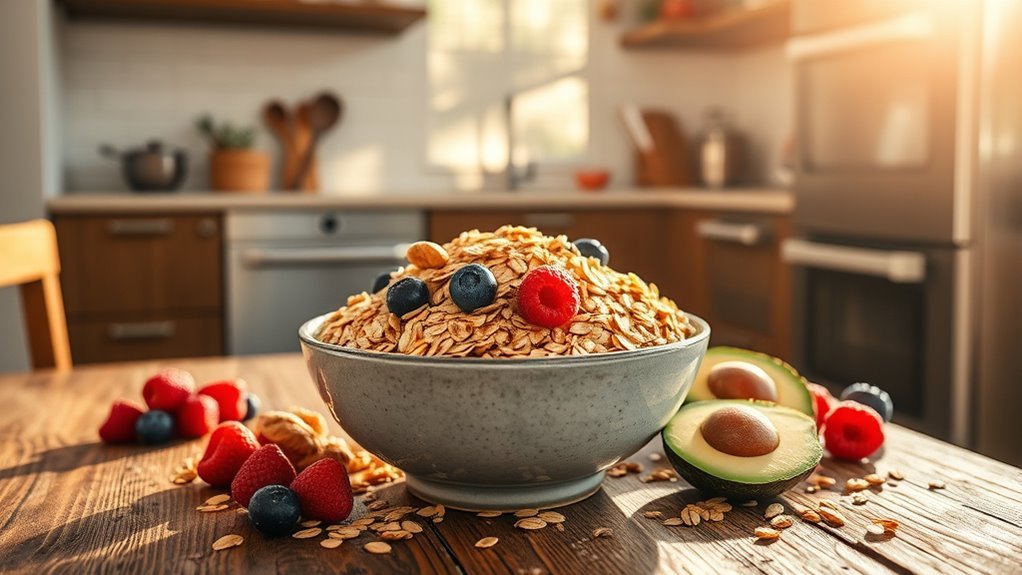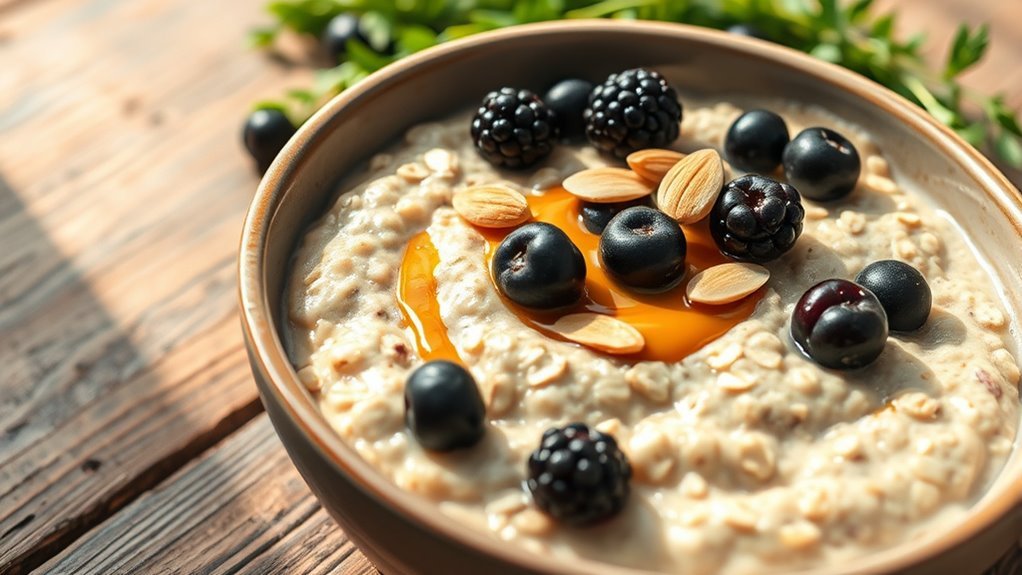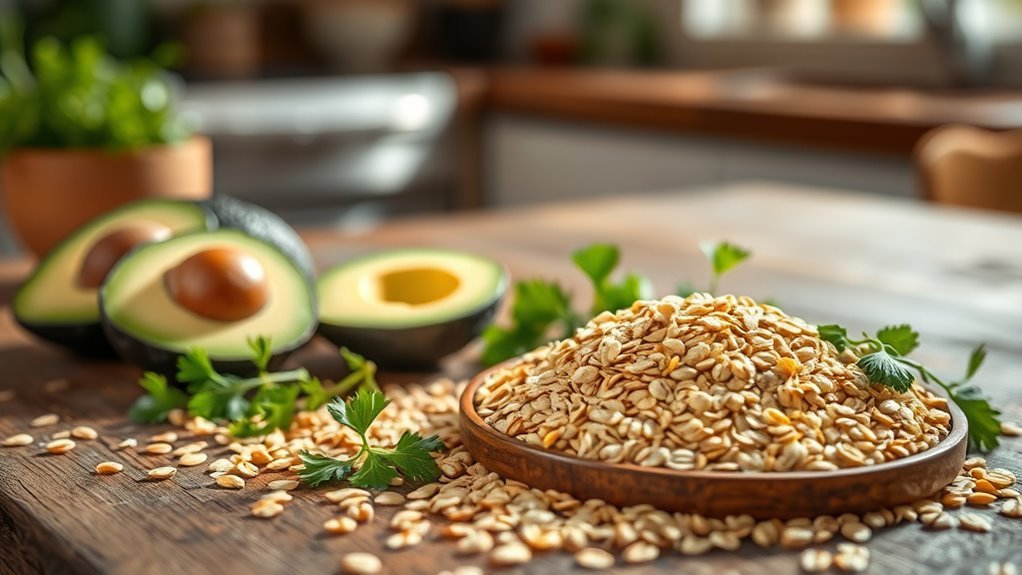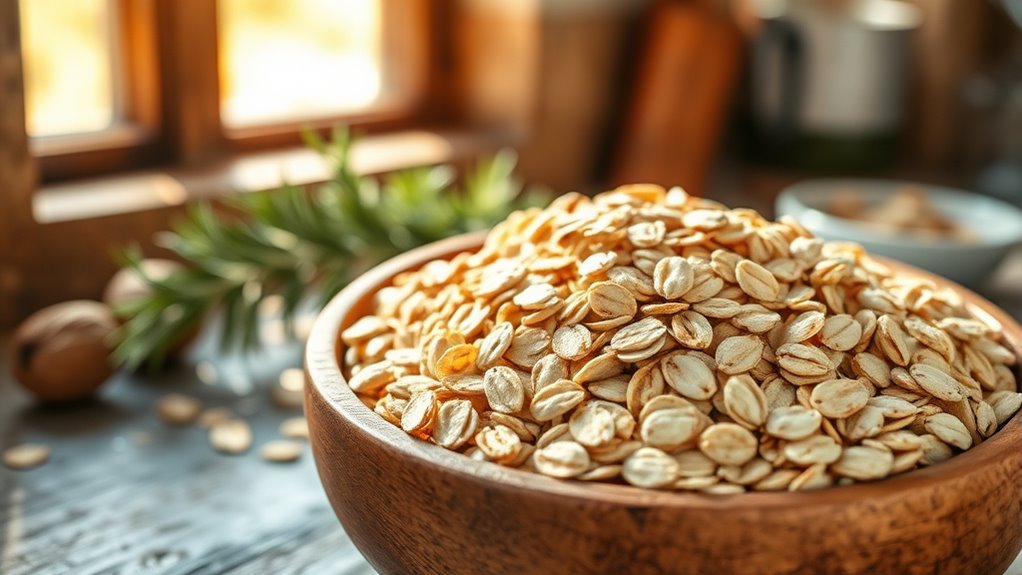Oats aren’t typically considered keto-approved due to their high carbohydrate content, with a typical serving containing about 27 grams of carbs. However, if you love oats, smaller portions can be included in a ketogenic meal plan, especially when paired with low-carb ingredients like nuts or seeds. It’s important to track your daily carb intake to maintain ketosis. If you’re curious about how to incorporate oats mindfully into your diet, there’s more to explore on this topic.
Understanding the Ketogenic Diet

When you’re exploring the ketogenic diet, it’s crucial to understand its fundamental principles. The ketogenic diet primarily emphasizes low carbohydrate intake, which encourages your body to shift from burning glucose to burning fat for fuel. This process, known as fat adaptation, allows your body to become efficient at utilizing stored fat, leading to potential weight loss and improved energy levels. Additionally, incorporating low-carb foods can help maintain effective ketosis and support your overall diet.
The Nutritional Profile of Oats

Oats are often celebrated for their impressive nutritional profile, making them a popular choice among health-conscious individuals. When you explore different oat varieties, like rolled, steel-cut, and instant oats, you’ll find they each offer unique benefits. A standout feature of oats is their high fiber content, particularly beta-glucan, which can aid digestion and promote heart health. This soluble fiber helps you feel fuller for longer, supporting weight management. Additionally, oats provide essential vitamins and minerals, including B vitamins, iron, and magnesium. They’re also a great source of antioxidants, which can combat oxidative stress. Incorporating oats into your diet can enhance your overall nutrition, but it’s crucial to evaluate how they fit into your personal dietary goals, especially if you’re following a ketogenic lifestyle.
Carbohydrate Content of Oats

While oats are packed with nutrients, their carbohydrate content is a key factor to contemplate, especially for those on a ketogenic diet. A typical serving of oats contains around 27 grams of carbohydrates, which can quickly add up when you’re aiming for low daily intake. However, it’s important to note that oats are rich in oat fiber, which can help mitigate blood sugar spikes. With a moderate glycemic index, oats can provide a steady energy release compared to other high-carb foods. If you’re considering oats, balance is essential. You might choose smaller portions or pair them with healthy fats and proteins to maintain ketosis. Ultimately, understanding oat carbohydrate content empowers you to make informed dietary choices. Additionally, it’s crucial to be aware of carbohydrate intake to avoid misconceptions about keto-friendly foods.
Oats vs. Other Breakfast Options
Although many breakfast options abound, oats stand out for their unique nutritional profile. When compared to oatmeal alternatives like granola or sugary cereals, oats provide a more balanced source of fiber and protein. They can keep you fuller for longer, which is essential for sustaining energy throughout the day. On the other hand, breakfast smoothies, while often nutrient-dense, can sometimes pack in excess sugars if not carefully crafted. If you’re looking for a versatile breakfast, oats can easily be combined with fruits, nuts, or even protein powders to enhance their benefits. Ultimately, your choice should align with your personal dietary goals and preferences, allowing you to enjoy breakfast without feeling restricted.
Potential Benefits of Oats
Oats offer a rich nutritional profile, packed with fiber, vitamins, and minerals that can support your overall health. They may also play a role in enhancing heart health by helping to lower cholesterol levels. Incorporating oats into your diet could provide these benefits while keeping your meals keto-friendly.
Nutritional Profile Overview
When considering a nutritious addition to a keto diet, the nutritional profile of oats reveals several potential benefits that may surprise you. Various oat varieties, such as rolled and steel-cut oats, boast impressive fiber content, particularly soluble fiber known as beta-glucan. This type of fiber can help regulate blood sugar levels, which is essential for those on a keto journey. Additionally, oats provide essential vitamins and minerals, including B vitamins, magnesium, and iron, contributing to overall health. While oats are higher in carbohydrates than typical keto foods, their nutrient density may offer benefits that align with your personal goals. By understanding oats’ nutritional profile, you can make informed choices about incorporating them into your diet.
Heart Health Support
Integrating oats into your diet may offer significant heart health benefits, particularly due to their high soluble fiber content. Oat fiber, especially beta-glucan, has been shown to reduce cholesterol levels, which is vital for maintaining a healthy heart. Studies highlight that regular consumption of oats can lower LDL cholesterol, often referred to as “bad” cholesterol, while supporting overall cardiovascular function. Plus, oats are naturally low in saturated fat, making them a heart-healthy choice. By including oats in your meals, you’re not just enjoying a versatile grain; you’re also investing in your heart health. So, whether it’s a bowl of oatmeal or an oat-based snack, you can feel good knowing you’re making a beneficial choice for your heart.
Incorporating Oats Into a Keto Meal Plan
Although traditional oats are often viewed as incompatible with a keto diet due to their higher carbohydrate content, there are ways to incorporate them wisely into your meal plan. Consider using small portions of oats in your oatmeal recipes, combining them with low-carb ingredients like nuts, seeds, or coconut milk. This allows you to enjoy the texture and flavor of oats while keeping your carb intake in check. For effective keto meal prepping, you can prepare overnight oats with chia seeds, which helps lower the net carbs. Just remember to track your total daily carb intake and adjust accordingly. By being mindful, you can enjoy the benefits of oats without compromising your keto lifestyle.
Alternatives to Oats on a Keto Diet
If you’re looking for alternatives to oats on a keto diet, you’re in luck—there are several low-carb options that can satisfy your breakfast cravings. Almond flour is a popular choice for pancakes or muffins, while chia seeds can be soaked overnight to create a pudding-like texture. Flaxseed meal is another great option, providing fiber and omega-3s, perfect for smoothies or baking. Coconut flour can be used in various recipes, offering a slightly sweet flavor. Psyllium husk adds bulk and can be used in keto bread. Finally, hemp hearts are packed with protein and healthy fats, making them ideal for topping yogurt or salads. These alternatives let you enjoy a satisfying breakfast while staying within your carb limits, and incorporating low-carb alternatives can enhance your meal prep creativity.
Frequently Asked Questions
Can I Eat Oats on a Strict Keto Diet?
You can’t eat oats on a strict keto diet if you’re aiming to stay within the typical 20-50 grams of carbs per day. Oat nutrition is rich in carbs; one cup of cooked oats has about 27 grams. While oats offer health benefits, they don’t align with keto guidelines that prioritize low-carb options. If you’re looking for alternatives, consider seeds or low-carb veggies to satisfy your hunger without breaking your keto commitment.
How Do Oats Affect Ketosis Levels?
Oats can notably impact your ketosis levels due to their carbohydrate content. If you’re carb counting, even a small portion can push you over your daily limit, potentially knocking you out of ketosis. While oats offer health benefits, like fiber, they’re not typically suitable for strict keto diets. If you want to enjoy oats, consider moderation and track your intake carefully to maintain your desired ketosis levels while still enjoying variety in your meals.
Are There Different Types of Oats for Keto?
Yes, there are different oat varieties, but they’re generally not considered keto-friendly due to their higher carb content. Rolled oats and steel-cut oats offer some nutritional benefits, like fiber and protein, which can aid digestion. However, if you’re aiming for ketosis, it’s best to limit or avoid oats altogether. Instead, consider alternatives like chia seeds or flaxseeds, which provide similar benefits while keeping your carb intake low, allowing you more freedom in your diet.
Can I Have Oat Flour on a Keto Diet?
You can have oat flour on a keto diet, but it’s important to be mindful of its nutrition. While oat flour offers fiber and some protein, it’s higher in carbs compared to traditional keto-friendly flours like almond or coconut flour. If you’re keen on keto baking, consider using oat flour sparingly or blending it with low-carb options to keep your overall carb intake in check while still enjoying delicious treats.
What Are Keto-Friendly Oat Substitutes?
If you’re looking for keto-friendly oat substitutes, consider options like chia seeds, flaxseeds, or almond flour. These low carb alternatives not only provide nutritional benefits but also help maintain your ketosis. Chia seeds are rich in fiber and omega-3s, while flaxseeds offer lignans and essential fatty acids. Almond flour is versatile for baking and cooking. By incorporating these substitutes, you can enjoy your meals while sticking to your keto lifestyle without feeling deprived.
References
- https://www.healthline.com/nutrition/are-oats-keto-friendly
- https://www.ncbi.nlm.nih.gov/pmc/articles/PMC5465818/
- https://www.medicalnewstoday.com/articles/322648
- https://www.dietdoctor.com/low-carb/oats
- https://www.washingtonpost.com/lifestyle/wellness/oats-keto/2021/06/30/8ea6a8e2-df2e-11eb-9c05-5054bba91b89_story.html
- https://www.mayoclinic.org/healthy-lifestyle/nutrition-and-healthy-eating/in-depth/oats/art-20044429
- https://www.nutrition.org.uk/healthyliving/basics/oats.html


